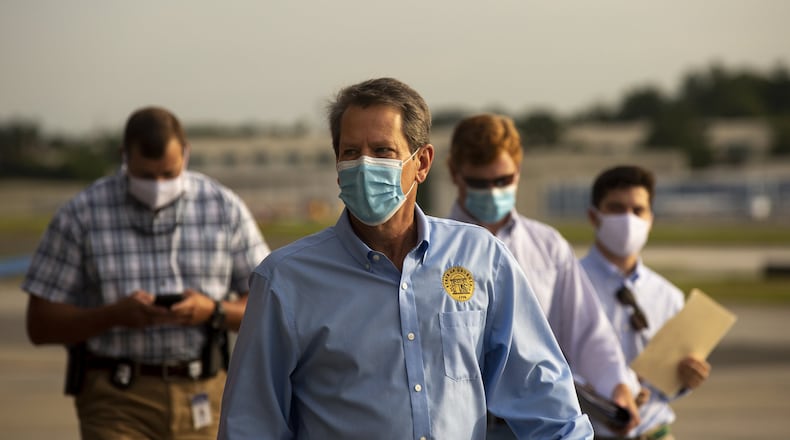There’s a growing revolt among cities upset that Georgia isn’t doing enough to contain the coronavirus. And Gov. Brian Kemp isn’t yet doing anything to stop it.
A week after Savannah became the first Georgia city to require the use of face masks, two other local governments joined their ranks. East Point lawmakers approved restrictions on Monday and officials in Kemp’s hometown of Athens followed suit on Tuesday. Several others have scheduled votes later this week.
The requirements could come into conflict with a statewide order from Kemp that "strongly encourages" – but does not mandate – the use of masks and bans local governments from enacting stricter or more lenient measure to fight the disease.
Supporters of the restrictions say they're unfazed by what could be a thorny legal challenge. They point to pleas from public health experts, the growing number of states with similar requirements and the surging number of coronavirus cases in Georgia, which passed the 100,000 mark on Tuesday.
READ | East Point becomes first city in Fulton to require masks
“It’s unfortunate that local governments must defy the governor to protect our constituents, but he leaves us no option,” said Athens-Clarke County Commissioner Russell Edwards, who backs the proposal. “His refusal to mandate CDC guidelines for mask-wearing forces others to lead.”
Kemp has called a statewide requirement a "bridge too far" and pursued a softer approach, including a "Wear A Mask" tour last week that touched down in seven Georgia cities over two days along with frequent warnings that college football season could be imperiled if his calls are ignored.
On a conference call on Tuesday with local officials, Kemp urged them to steer clear of mandates and to use social media and access to news media outlets to encourage residents to voluntarily don coverings. But he stopped short of threatening legal action.
READ | Atlanta to mandate face masks to contain coronavirus
“I realize that many on this call have different opinions on the appropriate response to this pandemic – and that’s fine. But we all agree that masks are good and can help stop the spread,” Kemp said.
“We all know that social distancing makes it hard for the virus to travel. We agree that handwashing can limit exposure. So instead of mandates, I’m asking you to join me in raising awareness.”
‘No conflict’
Savannah Mayor Van Johnson started the mask movement last week when he signed an ordinance that threatens violators with a $500 fine. He said he had little choice but to impose the restrictions as the city grappled with record-setting numbers of cases and thousands of tourists who refused to don masks.
It wasn’t immediately clear how many citations have been issued in Savannah, though a police spokesman said a “heavy emphasis” is on encouraging voluntary compliance.
While some mayors have ruled out a mandate as unenforceable, others have said they're closely monitoring Savannah's decision. East Point Mayor Deana Holiday Ingraham said the Southside city of 35,000 residents drew inspiration and language from Savannah's rules.
READ | Savannah mask mandate takes effect, putting Kemp in tricky spot
"We're not talking about politics, we're talking about whether people live," Ingraham said of the city's mandate, which carries a $75 penalty. "I just don't feel like we have the luxury or ability not to take action."
The city has logged 52 new cases over the last 14 days, she said, representing the highest increase of cases they’ve had since officials started collecting the data months ago. When asked about the possibility of being admonished by the state, Ingraham said Kemp’s silence spoke volumes.
“The fact that the governor has chosen not to act suggests that there is no conflict,” she said.
‘It’s up to us’
Many public health experts say said the evidence is clear that masks can prevent the spread of COVID-19. States and countries with mask mandates are seeing a slowdown in the infection rate.
But they also caution that simply recommending masks is not strong enough to stop the spread of the virus, urging that Georgians also practice social distancing and stay home when possible.
“We’ve learned at our own hospital that when we strongly encouraged (masks) we still saw community spread,” said Dr. Jonathan Lewin, the chief executive of Emory Healthcare, at a briefing last week. “When we required masks, we saw our infection rates within our workforce plummet.”
READ | Kemp warns college football is 'tall task' if Georgians don't don masks
Many other cities are steering clear. In Sandy Springs, for instance, there are no plans to adopt rules more stringent than the state’s order, said spokeswoman Sharon Kraun. A survey of other north Fulton cities found they have had little or no discussions about a mandate.
But officials in Athens predict a new wave of local governments could soon take action. The college town's leaders have experience pushing the limits with coronavirus, and enacted some of the most severe restrictions in the state to combat the coronavirus in late March before they were nullified by Kemp.
“We’re in a critical situation. There is no room to just hope that people will do the right thing,” said Commissioner Melissa Link shortly before a unanimous vote. “A mandate is absolutely necessary and the governor has made it absolutely clear he isn’t going to issue further restrictions. So it’s up to us.”
Already, several other governments are lining up. Council members in Fairburn and South Fulton have specially-called meetings on Wednesday to consider a face covering requirement. The state's higher education system reversed its position to require masks in classrooms. Political circles are buzzing with talk that other cities could soon take similar steps.
“If Governor Kemp won’t defend his executive orders against local governments enacting stronger pandemic protections,” said Edwards, the county commissioner, “then what purpose do his orders serve?”
Keep Reading
The Latest
Featured





